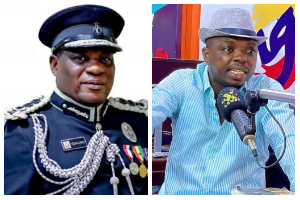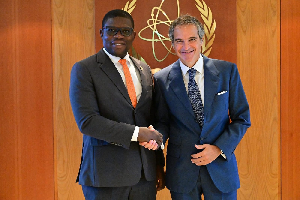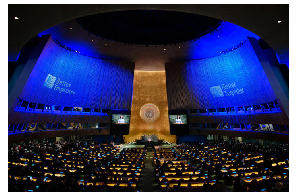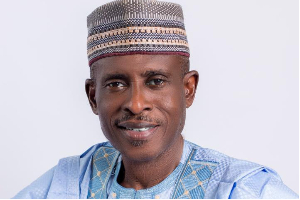Countrymen and women, loyalists and opponents, a couple of years ago, I had a dream. I guess I had taken a heavy bowl of fufu and ‘abe nkwan’ and so the dream was quite detailed. In that dream I saw a Sikaman in which everyone was patriotic, nationalistic, well-behaved, confident, disciplined and productive. Immediately I woke up from that dream, I decided to act. Without consulting anyone, I expanded the mandate of the information ministry to enable it oversee the process I chose to call ‘national orientation’. That’s why we now have a Ministry of Information and National Orientation.
Unsurprisingly, for more the 24 months, the new ministry did not do much ‘national orientation’. In fact, the first minister who was appointed to head the ministry didn’t have a clue why he had been given the job to spearhead national orientation. In his first radio interview after his appointment he spoke about how the president hates to see people pissing in public and how the whole orientation process is going to encourage people to stop doing that. That sounds familiar, doesn’t it? Vice Alui used almost the same imagery of people pissing in public as one of the foundations for his failed campaign for greater discipline. Well, the least said about that the better.
The point is that when my minister for national orientation went on radio to speak about how the programme will stop people from pissing in public, I realised that my dream is almost a replica of Alui’s. It was at this point that I decided to do some consultation about how citizens of Sikaman can be properly oriented. A few days ago, Alui – assisted by the new orientation minister, Oshobie – unveiled a five-point programme that is supposed to lead to national orientation. It’s the culmination of months of critical thinking and I’m glad it’s been rolled out, even though I am a bit disappointed that Alui of all people was the one who launched it. He launched a similar campaign a few years back and it failed. If I had not been engaged in some other pressing matter (I don’t know exactly what it was) I would have loved to be present to launch my own programme.
The national orientation effort seeks to instil five main attributes in every Sikaman citizen. First, we want people to be proud of their nation and their nationality. We are also seeking to encourage people to be patriotic and to put their country first in all they do. Through this programme we will intend to instil a certain minimum level of self-confidence in each citizen, whiles prodding them to be productive and disciplined.
Since the orientation programme was launched I have been pondering and I can’t help but think that we might be embarking on an utterly needless pursuit. We might be spending (or wasting) lots of money on media advertisements etc. when all we need to do as a government to show our people to live by the five orientation pillars is to lead by example. I keep slapping myself for not realising earlier that our people’s attitudes will not change in any way if we as leaders fail to first change our attitudes. To illustrate, let’s look at the five pillars one by one.
The first pillar of national orientation is national pride. It is very important for all of us to be proud of our nation and our nationhood. To a very large extent, I think, we are a proud people. But over the years, so much has gone wrong that a lot of our citizens will rather like to be associated with, say the USA, than with Sikaman. Every year, hundreds of Sikaman citizens acquire American or British citizenship. I am told that some of our brothers and sisters have even acquired Chinese citizenship. This is an indication that we are not as proud of our nation as we should be. What is there in Sikaman to be proud of? Do the filthy, stinky streets make you proud? Are you proud that diseases that are easily-treatable kill our people in the hundreds? Should we be proud that so many of us are very poor and cannot afford a single decent meal a day and are forced to live daily on a static diet of carbohydrates? How can anyone be proud of our educational system, our judicial system, our power supply and our transport system? I bet when you wait in a queue for two hours just to get onto a rickety ‘trotro’ to take you from one end of town to another, you will not be so proud.
All is not lost, though. I think we should be proud that, at the very least, we have a democratic system which is working very well for us. It’s important that we, as political leaders do not destroy this system in any way and that we use it to improve the lives of the people. I believe that when people start to see improvements in their lives as well as the creation of opportunities for them to live to their full potentials, there will be no need for the president or any minister of state to tell citizens to be proud of their country.
That leads us to the second pillar of national orientation – ‘patriotism and Sikaman first’. When people become proud of their nationhood and are willing to stand up anytime, anywhere to defend their country, we say they are patriotic. Patriotism, indeed, is in short supply in Sikaman and when people are not feeling so patriotic, they do not think about putting their nation first anywhere. I think that we have drummed enough into people’s ears to be patriotic. Yet, the level of patriotism keeps declining. We need therefore to try a different approach. People will not wake up one morning and become patriotic just because they’ve been told to be so. Patriotism is a habit that is cultivated over time after people have realised that the sacrifices they make will not go to waste. If Kwaku decides that he will not go on strike to demand more pay (which he rightly deserves) because the national economy is not doing so well, that’s a great sacrifice. But if after making that sacrifice, he gets to know that his president and ministers of state travel and take thousands of dollars daily as per diem, Kwaku will be justifiably pissed off and inclined to mobilise people to take to the streets to demand more pay. He was patriotic enough to put his nation first but his leaders did not do the same. That’s the situation we have in Sikaman right now. Many are not inclined to be patriotic and to put their nation first because they do not see their leaders putting the nation first.
As part of the orientation programme we want people to adopt a ‘can-do attitude’. This is an attitude most citizens possess already. We have people with sharp, inventive minds who know they are capable of achieving anything they set their minds to. But most of them are literally sitting on their talents because no matter how hard they try, some idiotic politician or civil servant puts impediments in their way. We can talk to citizens all we want to be a ‘can-do’ people but if we as leaders discourage and frustrate them, they will take their talents elsewhere. I don’t need to tell you about the large number of our citizens who are excelling elsewhere after they were literally forced to leave our shores to seek greener pastures, do I?
The fourth pillar of orientation is ‘productivity and accountability’. The idea here is for people to be more efficient and less corrupt. When citizens look up at us, their leaders, do they see these qualities? I don’t think so. We have too many ministers doing practically nothing except enriching themselves and busily enjoying the perks of their offices. Most of them spend their days delivering useless, unintelligible speeches at conferences, workshops and funerals – anywhere they will get an opportunity to show off and let the people know who they are. They are not as productive as they could be and they do not allow citizens to also be productive. When people are kept waiting for hours for a minister (or even the president) to show up at a programme to deliver what might turn out to be an uninspiring speech, do we have any moral justification to chide them for being unproductive? To add insult to injury, we in politics are not very accountable. Most of the time in Sikaman, we don’t know how our public servants spend their time and our money. If a government sets up an accountability office and refuses to let the public know what it’s been doing, it cannot ask the citizens to be accountable.
Finally, countrymen and women, loyalists and opponents, the national orientation programme calls on all citizens of Sikaman to be dedicated and disciplined. Good. But, here again, I believe that politicians should show the way. There are so many citizens who are dedicated and disciplined enough to show up at work on time to do what is expected of them. But there are many leaders whose only dedication is to plundering our coffers. These leaders are not disciplined enough to know when to stop doing what is wrong and start doing what is right.
To conclude, let me say that national orientation is a process that should start with political leaders setting an example for the rest of the citizenry to follow. What has been started is laudable but it won’t yield much if citizens see us doing things that are completely at variance with what we have been urging them to do – like asking them to tighten their belts whiles we continue to loosen ours.
Excellently yours,
J. A. Fukur
(fukuor@gmail.com)














